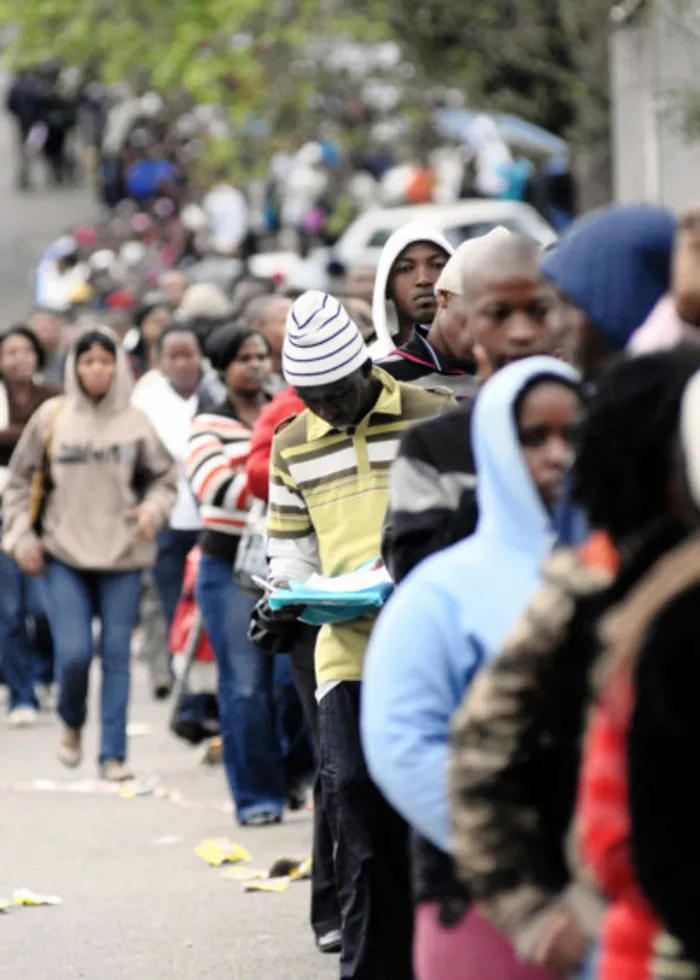We’ve achieved much, but we need to do more

Thousands of hopeful job applicants queue for 200 positions advertised by the Metro Police Department in Durban September 9, 2009. Unemployment figures in South Africa for the second quarter of 2009 stand at 23.6 percent, according to official government statistics. REUTERS/Rogan Ward (SOUTH AFRICA BUSINESS EMPLOYMENT) Thousands of hopeful job applicants queue for 200 positions advertised by the Metro Police Department in Durban September 9, 2009. Unemployment figures in South Africa for the second quarter of 2009 stand at 23.6 percent, according to official government statistics. REUTERS/Rogan Ward (SOUTH AFRICA BUSINESS EMPLOYMENT)
THE KEY preoccupation of the ANC is how to accelerate the fight against poverty, inequality and unemployment. While we opted for a mixed economy, we have to ask difficult questions about the commitment of the private sector to contribute more towards the creation of sustainable jobs.
Is the private sector ready to re-invest within the country or is it merely poised to keep its profits in low-interest earning savings accounts?
The partnership with the private sector may take our growth levels to another level, but should this be at all costs? This brings us to another important discussion of the question of state participation in the economy and how far such participation should extend.
There are some who expect the state simply to allow the market to dictate the economic growth path while the state sits as a spectator on the sidelines.
Debates within the alliance and civil society and business as a whole have underlined the key policy options that need to be decided upon by the ANC. Whatever we debate or decide must steer our policy direction towards pragmatic ways of ensuring that we are able to grow our economy and enable economic activity that creates job growth.
There has been a sense in which the state has been seen as apologetic in giving its stamp to the economic direction the country should take. The discussions that started at the policy conference early this year are aimed at addressing this with a potential outcome of some decisive moves that will ensure economic growth that is concomitant with the huge challenge that has been highlighted by the recent census.
The National Development Plan will be at the heart of these discussions outlining a non-partisan plan that will take the country forward. The ANC has already endorsed the plan, but the various actions developed in the plan must find expression in all sectoral policy statements of the ANC.
The government will also be expected to align all its current plans to this overarching plan to make sure that there is proper planning and the good work expressed in the plan finds expression in the country’s budget, among other follow-up interventions. We can ill afford another plan and policy that will not be implemented.
Over the past three years the country has observed a robust debate within the ANC on the question of nationalisation. It is now clear that the ANC has to finalise this question.
A clear policy directive in this regard is expected to emerge at the conference. After thorough research in this regard the ANC conference will be in a position to make a decision. A few key issues will guide this debate, including the question of existing policy, the implementation of the mining charter as well as international best practice.
Also, the matter of beneficiation of our natural resources and South Africa becoming a price-making country when it comes to mineral assets it has a dominant access of, such as platinum.
This debate also comes in the backdrop of the Marikana tragedy that began to put the transformation of the mining industry into sharp focus.
The ANC will deliberate on these issues to ensure that we protect our dominant position in the world when it comes to mining exports while maximising how our people benefit from these resources.
One of the crucial discussions that the conference will be seized with is the important political issue of how to deracialise our economy and broaden the base of economic activity. The question of black economic empowerment will be on the table to review how successful we have been in implementing this policy. There has been just too many complaints about the current model benefiting the few and not giving enough attention on areas that can stimulate entrepreneurship and create jobs.
The conference will contribute to the current public process that is meant to strengthen this important intervention in economic development.
Finally, in terms of state-owned enterprises and how these should contribute to the economy, the deeper questions have to be asked about how those enterprises align with government objectives to create jobs in the sectors where they operate.
The question of the working shareholder model must be discussed in greater depth, avoiding the blurring of roles between shareholder and operations. We have seen too many times where board accountability has been counterbalanced with shareholder mandate and interests. This is a matter the conference must resolve.
The eradication of poverty must be achieved by concerted effort and action by all who have been given the responsibility by the ANC wherever they may be deployed. The ANC has done plenty over the past 20 years. We have more to do to undo decades of colonialism and inequality to make sure that all our people can enjoy the fruits of freedom.
l Jessie Duarte is the chairwoman of the ANC national executive committee’s subcommittee on communication and head of monitoring in the ANC.